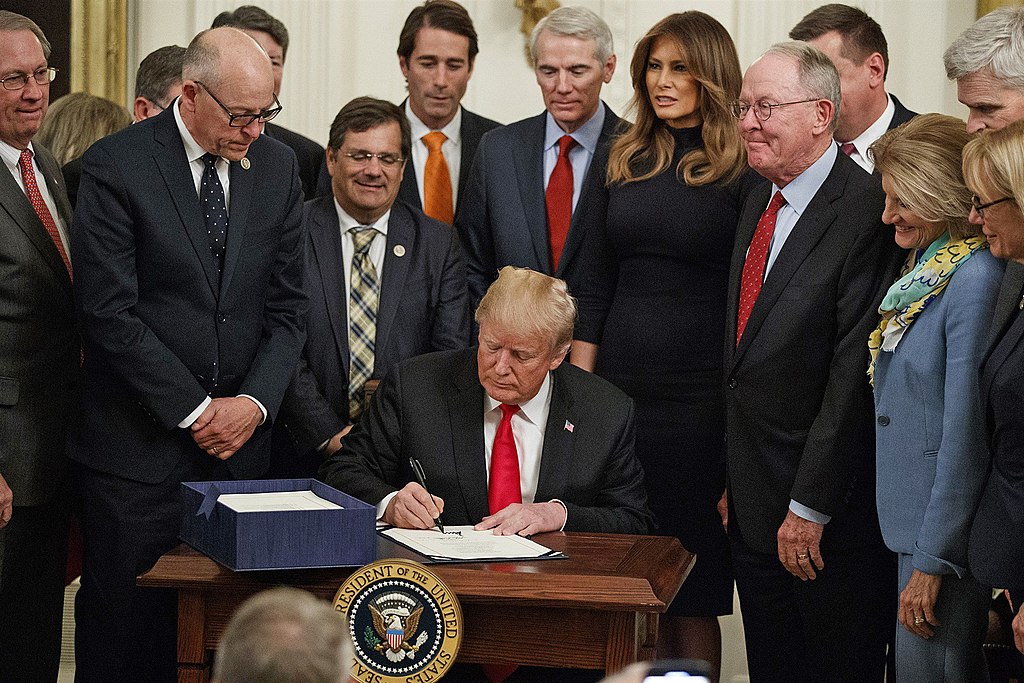A third of Americans reportedly agree with former President Donald Trump’s inflammatory remarks that undocumented immigrants "poison the blood" of the United States. A recent poll conducted by the Brookings Institution and Public Religion Research Institute (PRRI) highlights the deep divide in public sentiment over immigration in the U.S., with Trump's controversial rhetoric still resonating strongly with millions.
Poll Reveals Shocking Support for Trump’s Claims
The poll, which surveyed thousands of Americans, found that 33% of respondents agreed with Trump’s statement that undocumented immigrants "poison the blood" of the country. These remarks, made during his latest campaign rallies, have reignited national debates about immigration, race, and America’s demographic future.
Trump, who has made tough immigration policies a centerpiece of his political career, has long claimed that undocumented immigrants bring crime and instability, further fueling his calls for border security. However, this recent phrasing, referring to immigrants as "poison," has taken his rhetoric to a new level of harshness—one that many critics have denounced as dangerously xenophobic.
Divisive Language and Its Appeal
Despite the backlash, the Brookings Institution’s findings suggest that Trump's remarks are far from a fringe opinion. The study shows a growing number of Americans believe that immigration poses a significant threat to the nation's identity and social fabric. For many who side with Trump, his stark language reflects their fears about changing demographics, economic instability, and cultural shifts.
The poll also indicated that Trump’s support remains solid among certain voter blocs, particularly among conservative and older white Americans. His critics, however, argue that this kind of language only serves to deepen divisions, promoting fear and misunderstanding rather than constructive dialogue on immigration reform.
Critics Warn of Dangerous Rhetoric
Immigration advocates and human rights groups have condemned Trump’s statements, with many warning that such rhetoric could incite violence and hatred. “This language is reckless and unacceptable,” said a spokesperson for the American Civil Liberties Union (ACLU). “To describe immigrants in such dehumanizing terms only serves to fuel xenophobia and bigotry in this country.”
The Brookings and PRRI study also revealed that the percentage of Americans agreeing with Trump’s harsh language has increased since his first presidential run in 2016. This rise suggests that Trump's influence on shaping the national discourse on immigration remains powerful, even as he continues his campaign for the 2024 election.
Immigration Remains a Hot-Button Issue
As the 2024 election approaches, the issue of immigration is once again taking center stage. Trump’s hardline stance has pushed other candidates to address the subject, often with equally divisive rhetoric. Critics warn that as public debate grows more heated, the potential for real immigration reform may be overshadowed by fearmongering and extremism.
Trump’s controversial remarks, and the strong support they have garnered, are clear indicators that immigration will continue to be one of the most polarizing issues in American politics.



 Anutin’s Bhumjaithai Party Wins Thai Election, Signals Shift Toward Political Stability
Anutin’s Bhumjaithai Party Wins Thai Election, Signals Shift Toward Political Stability  U.S. Lawmakers to Review Unredacted Jeffrey Epstein DOJ Files Starting Monday
U.S. Lawmakers to Review Unredacted Jeffrey Epstein DOJ Files Starting Monday  Ohio Man Indicted for Alleged Threat Against Vice President JD Vance, Faces Additional Federal Charges
Ohio Man Indicted for Alleged Threat Against Vice President JD Vance, Faces Additional Federal Charges  Antonio José Seguro Poised for Landslide Win in Portugal Presidential Runoff
Antonio José Seguro Poised for Landslide Win in Portugal Presidential Runoff  Nicaragua Ends Visa-Free Entry for Cubans, Disrupting Key Migration Route to the U.S.
Nicaragua Ends Visa-Free Entry for Cubans, Disrupting Key Migration Route to the U.S.  US Pushes Ukraine-Russia Peace Talks Before Summer Amid Escalating Attacks
US Pushes Ukraine-Russia Peace Talks Before Summer Amid Escalating Attacks  Japan Election 2026: Sanae Takaichi Poised for Landslide Win Despite Record Snowfall
Japan Election 2026: Sanae Takaichi Poised for Landslide Win Despite Record Snowfall  Jack Lang Resigns as Head of Arab World Institute Amid Epstein Controversy
Jack Lang Resigns as Head of Arab World Institute Amid Epstein Controversy  Bosnian Serb Presidential Rerun Confirms Victory for Dodik Ally Amid Allegations of Irregularities
Bosnian Serb Presidential Rerun Confirms Victory for Dodik Ally Amid Allegations of Irregularities  China Warns US Arms Sales to Taiwan Could Disrupt Trump’s Planned Visit
China Warns US Arms Sales to Taiwan Could Disrupt Trump’s Planned Visit  Trump Congratulates Japan’s First Female Prime Minister Sanae Takaichi After Historic Election Victory
Trump Congratulates Japan’s First Female Prime Minister Sanae Takaichi After Historic Election Victory  New York Legalizes Medical Aid in Dying for Terminally Ill Patients
New York Legalizes Medical Aid in Dying for Terminally Ill Patients  Trump Backs Nexstar–Tegna Merger Amid Shifting U.S. Media Landscape
Trump Backs Nexstar–Tegna Merger Amid Shifting U.S. Media Landscape  Bangladesh Election 2026: A Turning Point After Years of Political Suppression
Bangladesh Election 2026: A Turning Point After Years of Political Suppression  Netanyahu to Meet Trump in Washington as Iran Nuclear Talks Intensify
Netanyahu to Meet Trump in Washington as Iran Nuclear Talks Intensify  India–U.S. Interim Trade Pact Cuts Auto Tariffs but Leaves Tesla Out
India–U.S. Interim Trade Pact Cuts Auto Tariffs but Leaves Tesla Out  Trump Allows Commercial Fishing in Protected New England Waters
Trump Allows Commercial Fishing in Protected New England Waters 































